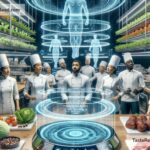The Future of Food and Global Collaboration: Working Together to Feed the World
Food is one thing we all need—not just to survive, but to thrive. It nourishes our bodies, connects families and communities, and shapes cultures. But right now, the way we produce, access, and consume food is facing big challenges. Climate change, population growth, and unequal distribution have made it hard for everyone to get the food they need. At the same time, advances in technology and collaboration offer exciting solutions for the future of food.
In this blog, we’ll explore how global collaboration and innovation can help create healthier, fairer, and more sustainable food systems. When people from different parts of the world come together and share ideas, we can solve these food challenges and create a better future.
What Are the Challenges in Food Systems?
Before we dive into solutions, let’s understand the problems first. Right now, the way we grow, produce, and distribute food has many issues:
-
Climate Change: Extreme weather events, droughts, and floods caused by climate change affect crops and food supplies. Farmers are struggling to adapt to unpredictable conditions.
-
Food Waste: Around one-third of all food produced in the world is wasted. This happens while millions of people go hungry every day. Reducing waste could feed many people and protect resources.
-
Population Growth: By 2050, the world’s population is expected to grow to nearly 10 billion people. Feeding that many people will require massive changes in how food is produced.
-
Inequality: Some people have more than enough food, while others don’t have enough to eat. Access to food isn’t equal, and poverty plays a big role in creating hunger.
-
Environmental Harm: Current agricultural practices consume too much water, destroy biodiversity, and rely heavily on chemicals that harm the soil and ecosystems.
These challenges are huge, but they’re not impossible to solve. In fact, creative minds around the world are already working toward better solutions.
Innovations in Food Production
Technology is changing the way we think about food. Farmers, scientists, and entrepreneurs are using new tools to grow food with less impact on the planet. Some exciting innovations include:
-
Vertical Farming: Imagine farms in buildings instead of fields. Vertical farms grow plants indoors using stacked shelves and controlled environments. This method uses less land and water while allowing crops to grow year-round.
-
Lab-Grown Meat: Scientists can now produce meat without raising animals. Lab-grown or “cultivated” meat uses cells to grow protein in a more ethical and sustainable way.
-
Plant-Based Alternatives: Plant-based foods are becoming more popular as substitutes for meat and dairy. They’re healthier for people and better for the environment.
-
Smart Farming: Farmers use technologies like drones, sensors, and AI to monitor crops, improve efficiency, and reduce waste.
-
Regenerative Agriculture: This farming practice focuses on building healthier soil and restoring ecosystems through techniques like crop rotation, composting, and reducing chemicals.
These innovations might seem futuristic, but many are already being put into action. They show us that the future of food can be more sustainable and efficient.
Why Global Collaboration Matters
Food is a global issue. While one country might solve its own hunger problems, food challenges cross borders—climate change, trade issues, and inequality affect the entire world. That’s why global collaboration is essential.
When countries, organizations, and communities work together, we can share solutions that benefit everyone. Here are a few ways global collaboration can help:
-
Sharing Knowledge: Different countries face different challenges. A drought-resistant crop developed in one country can help farmers in another. Sharing technology and expertise allows everyone to benefit.
-
Global Research Networks: Scientists from across the globe can work together to develop solutions that address soil health, food security, and nutrition. Open collaboration leads to faster progress.
-
Empowering Communities: Participatory collaboration involves listening to farmers, indigenous people, and local communities to understand their needs and solutions. These diverse voices can guide better policies and innovations.
-
Sustainable Trade: Creating fair trade agreements ensures that farmers worldwide are paid fairly for their work. It also gives consumers access to diverse and affordable food.
-
United Action Against Hunger: International organizations like the United Nations and grassroots charities help distribute food where it’s needed most, especially in crisis situations.
The key to fixing our food systems is cooperation. No single country, company, or individual can do it alone. It requires all of us—every nation and community—to work toward common goals.
How Can You Be Part of the Solution?
You may not be a scientist or policymaker, but everyone can contribute to the future of food in small ways. Here’s how you can help:
- Reduce Food Waste: Buy only what you need, store it properly, and use leftovers wisely.
- Support Local Farmers: Shop at farmers’ markets or buy locally produced foods to reduce transportation emissions.
- Eat Sustainably: Choose more plant-based meals or environmentally friendly food options.
- Learn and Advocate: Educate yourself about food challenges and support organizations or policies that promote sustainable practices.
- Share Ideas: Talk to people in your community about these issues. Collaboration starts with conversation.
Looking Ahead
The future of food is filled with possibilities. With smarter technology, innovative farming, and global collaboration, we can create food systems that are fairer, healthier, and better for the planet. But there’s still work to do—and it involves all of us. By working together, we can ensure that every person has access to good food for years to come.
So, let’s start talking, sharing, and creating solutions together—because the future of food depends on us all.

